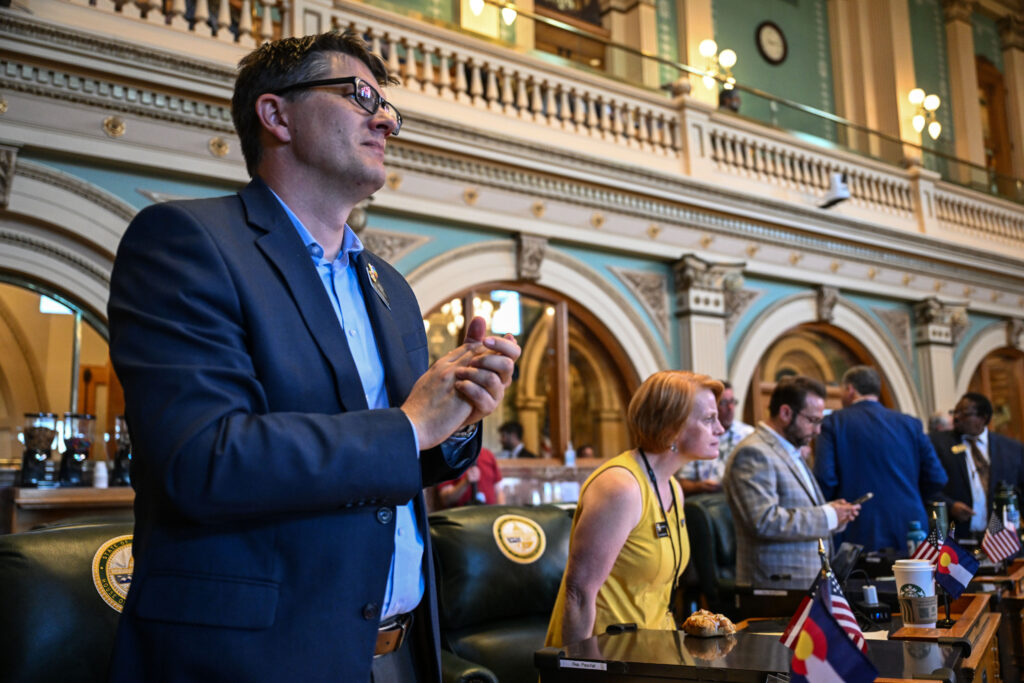Colorado bill could shift tap fees to existing customers, water districts warn
Water districts around Colorado expressed worries over a bill that would limit tap fees charged by boards of sanitation and special districts, arguing it could lead to unintended financial burdens on residents.
Tap fees are one-time fees paid by property developers or owners to connect to a public water or sewer system. Fee amounts are set by sanitation and water districts and typically range from several hundred to several thousand dollars.
House Bill 1211, sponsored by Reps. Rebekah Stewart, D-Lakewood, and Sheila Lieder, D-Littleton, along with Sen. Jeff Bridges, D-Greenwood Village, says water and sanitation boards of special districts must provide water service if they are able to do so.
The bill requires the district to consider at least one of several conservation-related factors when determining tap fee amounts, including long-term water usage and the presence of any low-water-use appliances or greywater treatment systems in the development.
Boards would also be mandated to ensure tap fees are “reasonably related” to the costs incurred by the district in providing water service, which Stewart said is already required but not yet codified into statute.
While most tap fees imposed by special districts are reasonable already, a few bad actors have levied them in attempts to influence land use or discourage the development of affordable housing, Stewart said.
“This is already the law, but it ensures the standard is laid out clearly so everyone is playing by the same rules,” Lieder told the House Transportation, Housing, and Local Government Committee during a February. “This should be clear in order to ensure that special water districts are not using the withholding of existing resources in order to influence land use”
The bill passed through the House on a 36-27 vote and will next be heard by a Senate committee.
Chelsea Benjamin of the nonprofit Western Resource Advocates called the bill “an important step” to encourage water conservation-oriented tap fees for new housing developments in Colorado.
Several districts in places like Aurora and Denver already consider developments’ water conservation measures when determining tap fees, Benjamin said. For example, Denver Water offers reduced tap fees to developers who install water-efficient appliances in their homes.
“HB 1211 strikes a good balance in allowing special districts the flexibility to choose what makes sense for their tap fees, while encouraging more equitable fees and lowering water use simultaneously,” said Benjamin.
Lakewood City Councilman Roger Low said the bill will help increase the much-needed housing supply in his city and other parts of the Denver Metro area.
Water and sewer tap fees often impose a “prohibitive barrier” on landowners and developers looking to build affordable housing developments or accessory dwelling units, Low said, adding that his constituents have reported being charged over $20,000 in tap fees for ADUs.
“It is increasingly apparent that at least some water districts may introduce other factors in this fee setting; for instance, opposition to new development, ADUs, and new housing configurations,” he said. “Requiring that a tap fee be reasonably related to the cost incurred by the water district in providing water service as this bill does is good policy and a common-sense safeguard.”
Meanwhile, water districts said the measure could have unintended consequences that far outweigh any benefits.
“We have serious concerns with HB25-1211,” said Eric Reckentine, the district manager of North Weld County Water District. “Water districts have a responsibility to provide water to consumers within their district, and the cost of providing new services is paid through user fees. Current law already requires that tap fees be no greater than necessary to defray such impacts directly related to the proposed development.”
According to Reckentine, water district managers are worries about the bill’s provision requiring them to provide lower tap fees for projects that incorporate water conservation measures. They argued that this could shift costs to existing customers, forcing them to bear some of the cost of new developments.
The policy is too broad, added Chris Pletcher of the Fort Collins-Loveland Water District. He called the bill an attempt to solve a problem that doesn’t exist, creating a conflicting legal framework for special districts.
In Reckentine’s view, a better approach would be to require third-party rate analyses to ensure districts charge fair and reasonable tap fees, while allowing them to collect revenue for future projects and capacity needs.
“The bottom line is that this bill is a cost shifter within the system and acts for one customer segment as an artificial cost reducer,” he said. “Our customers are already paying their costs. If a new housing project is proposed, whether single-family or multi-unit — we believe that the new project must pay their fair share of the costs associated with ‘tapping’ into the service, rather than passing that burden to current users.”
Colorado Politics Must-Reads:



